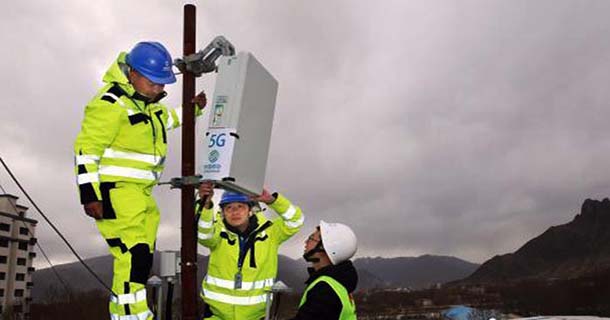
Technical workers were installing the device of 5G base station in Lhasa, Tibet.
Photo: Chinanews
China Mobile says that it has set up its first three 5G stations in the Tibetan Autonomous Region (TAR) with the help of Chinese telecom giant, Huawei, in order improve the communication infrastructure for the local population.
However, this move on March 1 was seen by experts as more of a military tactic by the Chinese government. They argued that the current level of economic development in the region did not warrant such advanced technology and that this was intended for the benefit of the military in the area.
This technology could enable the military to monitor the mountainous border, deployment of weapons and improve battlefield communications, according to experts. These stations could be a potential strategic advantage to the Chinese military in the regions that border India, they noted.
Huawei Founder Ran Zhengfei in a recent interview addressed concerns of the part of 5G technology in military operations stating that its role has been exaggerated and that it is not at the same level as other military equipment. “(5G technology) is not an atomic bomb,” he said.
Of the three stations that have been set up, one is already functional and can provide capable devices with internet download speeds of up to 530 megabytes per second (Mbps). The new base stations have been installed at the Huawei building, the Lhasa Posts and Telecommunications School and at the office of the Tibet Post Group in Lhasa, China Mobile said.
The installation of these stations did not come without their problems though, as cold weather and high altitudes posed challenges in the Qinghai-Tibet Plateau region and optical fibre lacks stability in these conditions, according to Xiang Ligang, Chief Executive of telecom industry news site cctime.com.
“Electricity supply alone is a complex process,” said Xiang. “It is important to realise synchronous development of 5G service between Tibet and other regions in China, which is a move we’ve been talking about since 4G kicked in.” He continued, saying that these obstacles will be overcome as transport, communication and energy are equally important for the economic development of the region.
China Mobile’s Tibet office will now focus on accelerating testing and implementation of 5G in Tibet so that even residents of its rural areas can have access to the latest communication services, according to Chinese news site tibet.cn.




 Print
Print Email
Email